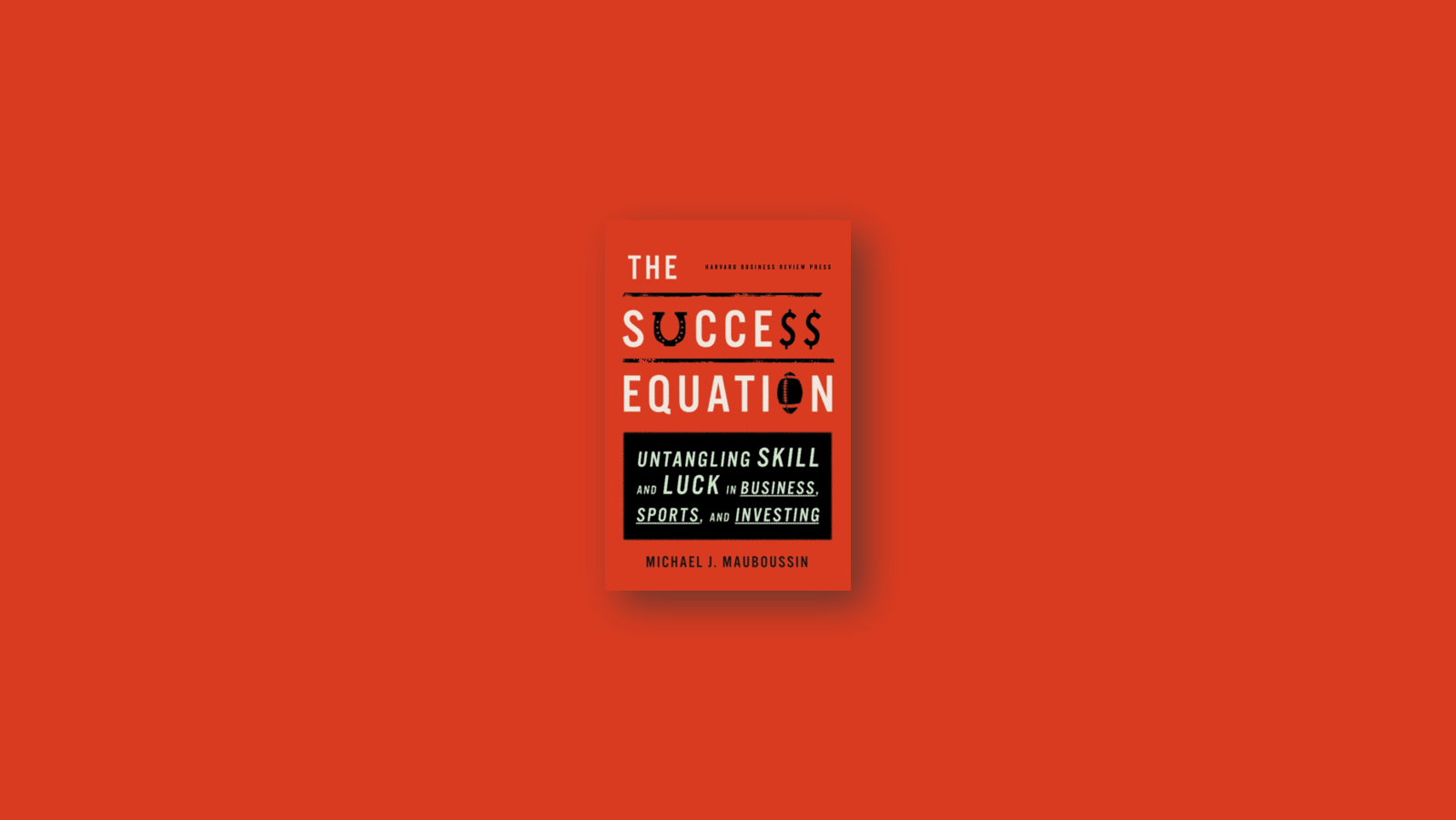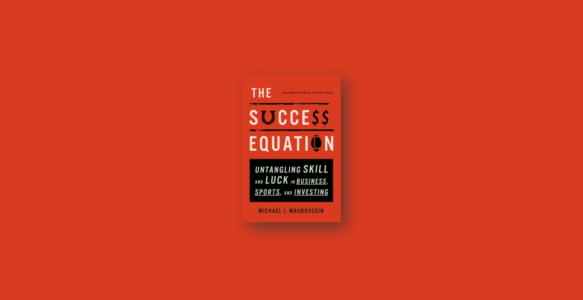Kindle | Hardcover | Audiobook
Skill, Luck, and The Luck-Skill Continuum
To visualize the mix of skill and luck we can draw a continuum. On the far right are activities that rely purely on skill and are not influenced by luck. Physical activities such as running or swimming races would be on this side, as would cognitive activities such as chess or checkers. On the far left are activities that depend on luck and involve no skill. These include the game of roulette or the lottery. Most of the interesting stuff in life happens between these extremes.
Why We’re So Bad at Distinguishing Skill from Luck
We re-create events in the world by creating a narrative that is based on our own beliefs and goals. As a consequence, we often struggle to understand cause and effect, and especially the relative contributions of skill and luck in shaping the events we observe. We may make the mistake of drawing conclusions from samples that are too small. We may fail to consider all of the causes that might lead to particular events. We might test too much—so much, in fact, that we wind up finding causes where we’re simply seeing the results of chance. Or we may look at high performance and believe we are seeing a star with exceptional skill, when in reality we are seeing the combined effects of skill and the powerful influence that an organization can exert on someone. All of these mistakes are manageable, but it is critical to learn about them and to see where they apply if we are going to overcome them. The effort of untangling skill from luck, even with its practical difficulties, still yields great value when we are trying to improve the way we make decisions.
More Skill Means Luck Is More Important
As skill improves, performance becomes more consistent, and therefore luck becomes more important. Stephen Jay Gould, a renowned paleontologist at Harvard, developed this argument to explain why no baseball player in the major leagues has had a batting average of .400 or more for a full season since Ted Williams hit .406 in 1941 while playing for the Boston Red Sox. All professional hitters have become more skillful, and therefore the difference between the best and worst has narrowed.
You can readily see how the paradox of skill applies to other competitive activities. A company can improve its absolute performance, for example, but will remain at a competitive parity if its rivals do the same. Or if stocks are priced efficiently in the market, luck will determine whether an investor correctly anticipates the next price move up or down. When everyone in business, sports, and investing copies the best practices of others, luck plays a greater role in how well they do.
Organizations Lose Skills As They Age
People lose skill with age, but so do organizations. Great sports teams, for instance, are a collection of above-average players. But even a team that stays together a long time inevitably declines because the players age and management is hard-pressed to replace them at an effective cost. One of the reasons that teams are so difficult to run is that managers must constantly replace older players with younger players. Older players tend to be known entities, which means that their value is reflected in their salary. Younger players are more difficult to assess. So sports executives are trading the known for the unknown.
Probably the best explanation for why companies decline is that they fall prey to organizational rigidities. Companies must balance exploiting profitable markets with exploring new markets. Exploiting known markets requires optimizing processes and executing effectively, and leads to reliable, near-term success. Exploring unknown markets requires search and experimentation and offers none of the immediate benefits of exploitation. Finding the best balance between exploration and exploitation depends on the rate of change in the environment. When change comes slowly, the balance can tilt toward exploitation. When it comes quickly, an organization must dedicate more resources to exploration, since profits are quickly exhausted. In general, companies tend to lean more on exploitation, which increases efficiency and profits in the short run but makes the company rigid, a state of affairs that only grows worse with age.
The Many Shapes of Luck
At this point, you probably accept the intellectual case that it is possible for skill, or quality, to play only a minor role in commercial success. But, if you are like me, you have a hard time accepting that there isn’t something just a little special about The DaVinci Code, Titanic, or the Mona Lisa. The very fact that they are so wildly popular seems to be all the evidence you need to conclude that they have some special qualities that make them stand out above all the rest. But all three were surprises. Our minds are expert at wiping out surprises and creating order, and order dictates that these products are special.
We are very good at fooling ourselves about our own success, a phenomenon that psychologists call the self-serving attribution bias. It is common for us to attribute success to our own terrific skill, even in endeavors that are determined mostly by luck. Part of the explanation is that we see ourselves as capable agents. We can do things. We can make things happen. So we assume that our skill caused the success we experience. On the other hand, we readily attribute failure to external causes, including bad luck.
People who work in businesses where social influence operates are often paid for good luck, although they generally don’t suffer symmetrically from bad luck. This issue, of course, is central to the outrage about the financial crisis that occurred from 2007–2009. Many finance professionals, including bankers, traders, and brokers, collected outsized pay when the markets were ascending, capitalizing on good luck. But when the financial system nearly collapsed and a number of large firms went out of business, governments had to step in to stabilize the system. The gains were privatized and the losses were socialized, leading to a palpable sense of unfairness. Paying for luck is not limited to finance. It occurs in many fields, such as music, art, and movies. Even so, we should do our best to measure and reward success properly while acknowledging luck for what it is.
Building Skill
Whether or not you can improve your skill depends a great deal on where the activity lies on the luck-skill continuum. In cases where there is a clear relationship between cause and effect, and in activities that are stable and linear, deliberate practice is the only path to improvement. Near the skill side of the continuum, the quality of your performance provides dependable feedback on your progress when you’re trying to improve your skill. If an activity involves luck, then how well you do in the short run doesn’t tell you much about your skill, because you can do everything right and still fail, or you can do everything wrong and succeed. For activities near the luck side of the continuum, a good process is the surest path to success in the long run.
The bottom line is this. Accurate feedback is essential no matter where you are on the continuum. Improving your skill means constantly looking for ways to change your behavior, either because what you’re doing is wrong or because there’s a slightly better way of doing it. This is true whether you are a basketball player shooting free throws, a doctor performing surgery, an executive making acquisitions, or an investor buying stocks. No matter what your profession or level of expertise, the chances are very good that accurate feedback can improve your performance.
Dealing with Luck
By definition, luck is something that no one can control. But there are ways that you can manage it more effectively. In competitive interactions, the strong should seek to simplify to emphasize their advantage in skill and the weak should try to add randomness to dilute the stronger player’s advantage. This approach has proved useful in sports, business, and war, and yet many people fail to use it because of tradition, a lack of awareness, or because they are afraid of damaging their careers by doing something different and then failing.
In some cases, it is helpful for you to consider luck as equivalent to a lack of knowledge. In particular, in an activity dominated by luck, the relationship between cause and effect is difficult to discern. But organizations can now get a clearer sense of cause and effect than they had before through a combination of applied scientific methods and technology, thereby reducing the role of luck. Researchers can get a better understanding of how cause and effect interact through experiments that use both a control group and an experimental group. Scientists can now carry out experiments on a much larger and more cost effective scale because of new technology. That in turn is leading to large improvements in efficiency.



